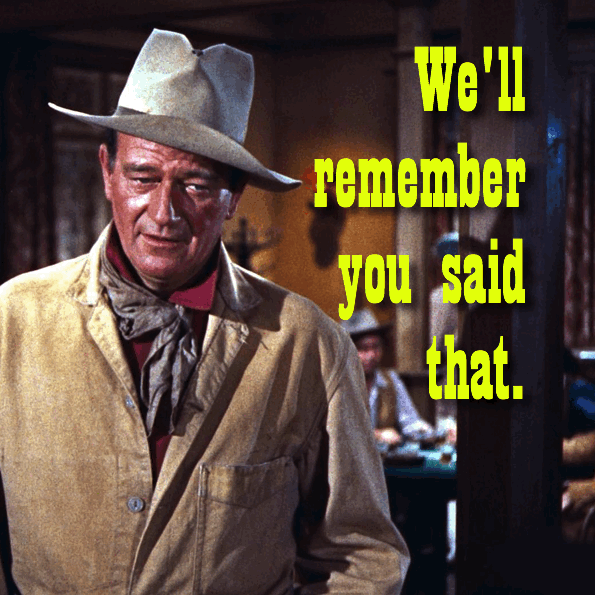“If You Have A Message…
…send it Western Union.” That saying by movie mogul Samuel Goldwyn appears semi-literate and anti-intellectual at first glance, but it’s actually pretty sage advice.
Goldwyn’s point, made in his inimitable Neanderthal style, was that trying to tell a story about A Very Important Matter almost always did a disservice to both the story and said Very Important Matter.
Ya gotta sneak up on these things, and if a writer wants to say something about A Very Important Matter, well, to quote Mary Poppins, a spoonful of sugar makes the medicine go down.
A story is never really about what it seems to be about. Rio Bravo, one of the all time classic Westerns, is not about seeing a bad guy gets justice; it’s about the necessity of building a community.[1]El Dorado, a remake of Rio Bravo using the same story and stock characters, with the same star & writer & director, again is not about seeking justice but about surviving scars, both physical and psychic.[2]
Write a story and it will have a subtext / theme / moral / point all its own. You can’t keep it out. The very words you choose, the order in which you arrange your scenes, all these things will convey your true meaning, even if you’re trying to hide it from yourself.
Bernard Malamud once said, “I would write a book, or a short story, at least three times — once to understand it, the second time to improve the prose, and a third to compel it to say what it still must say.”
I’ve seen a variant on that which runs along the lines of: “Use the first draft to tell yourself the story, the second draft to figure out what the story is really about, and the final draft to figure out how to tell the story.”
Theodore Sturgeon once told me a story about how he had suffered a particularly bad case of writer’s block during the infamous Army-McCarthy hearings.
Suffering a writer’s block would have been bad enough in and of itself, but he had already accepted (and spent!) a sizeable advance from editor H.L.Gold of Galaxy magazine for a novella he was now incapable of delivering.
He called Gold up and confessed his problem, telling him “I want to say something about the hearings, but I just can’t figure out how to say it.”
Gold listened sympathetically then said, “Do this: Start writing a story that begins with a man at a bus station waiting for his wife to return from a trip. When the bus pulls in, she gets off but doesn’t see her husband at first. There’s a man behind her on the bus and he’s carrying her suitcase. That man hands her the suitcase, then she sees her husband, walks over, and kisses him.
“Start your story that way, and by the end of it I guarantee everybody in America will know exactly how Theodore Sturgeon feels about Senator Joe McCarthy.”
(Sturgeon took Gold’s advice and, with slight modifications, turned it into one of his best known works: “Mr. Costello, Hero” You can hear a radio dramatization of it here.)
Given a choice between Bernard Malamud looking all pensive and intellectual and John Wayne blastin' the @#%& outta sumbuddy, hoodya think I'd choose to illustrate this post?
© Buzz Dixon
[1] In this case figuratively and not literally; the town of Rio Bravo is already well established at the start of the movie, the community that forms is the small band of people who come together to defend one another against fearful odds.
[2] Wayne, Hawks, and Brackett went to the same well a third time with Rio Lobo, of which we shall not speak. brrr…


![Thinkage [updated]](https://images.squarespace-cdn.com/content/v1/590697e7d1758ec4d7669624/1532757219066-66RCQ5TYGXAGXSXG3QX1/fritz-kahn-brain_lg+SQR.jpg)
![Thinkage [updated]](https://images.squarespace-cdn.com/content/v1/590697e7d1758ec4d7669624/1532757188211-JPHJV6VJCOYA4G45FYR2/fritz-kahn-brain_lg+SQR.jpg)